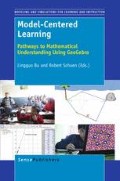Abstract
This chapter argues for a future-oriented approach to mathematical problem solving, one that draws on the investigation of real world modeling activities with the aid of GeoGebra, a conceptual tool that integrates dynamic geometry, algebra, and spreadsheet features. We give consideration to the?odels and?odeling Perspective (MMP) as a means for introducing modeling activities, and we address how GeoGebra enriches students’ exploration and understanding when solving such problems.
Access this chapter
Tax calculation will be finalised at checkout
Purchases are for personal use only
Preview
Unable to display preview. Download preview PDF.
REFERENCES
Blomhøj, M. (1993). Modelling of dynamical systems at O-level. In J. de Lange, C. Keitel, I. Huntley, & M. Niss (Eds.), Innovation in mathematics education by modelling and applications (pp. 257–268). Chichester: Ellis Horwood.
Blum W., & Niss M. (1991). Applied mathematical problem solving, modeling, applications, and links to other subjects: State, trends & issues. Educational Studies in Mathematics, 22, 37–68.
Christou, C., Mousoulides, N., Pittalis, M., & Pitta-Pantazi, D. (2004). Proofs through exploration in dynamic geometry environments. International Journal of Science and Mathematics Education, 2(3), 339–352.
Doerr, H.M., & English, L.D. (2003). A Modeling perspective on students’ mathematical reasoning about data. Journal of Research in Mathematics Education, 34(2), 110–136.
English, L. D. (2006). Mathematical Modeling in the primary school. Educational Studies in Mathematics, 63(3), 303–323.
Greer, B. (1997). Modeling reality in mathematics classroom: The case of word problems. Learning and Instruction, 7, 293–307.
Lesh, R. A., & Doerr, H. M. (2003). Beyond constructivism: A models and modelling perspective on teaching, learning, and problem solving in mathematics education. Mahwah, NJ: Lawrence Erlbaum.
Lesh, R. A., & Zawojewski, J. S. (2007). Problem solving and modeling. In F. Lester (Ed.), Second handbook of research on mathematics teaching and learning (pp. 763–804). Greenwich, CT: Information Age Publishing.
Miles, M., & Huberman, A. (1994). Qualitative Data Analysis (2nd Ed.). London: Sage Publications.
Mousoulides, N. (2007). A Modeling Perspective in the Teaching and Learning of Mathematical Problem Solving. Unpublished Doctoral Dissertation. University of Cyprus.
Mousoulides, N., & English, L. D. (2008). Modeling with Data in Cypriot and Australian Classrooms. The 32nd International Conference of the International Group for the Psychology of Mathematics Education (Vol. 3, pp 423–430). Morelia, Mexico.
Mousoulides, N., Christou, C., & Sriraman, B. (2008). A Modeling Perspective in Mathematical Problem Solving. Mathematical Thinking and Learning, 10(3), 293–304.
Mousoulides, N., Pittalis, M., Christou, C., Boytchev, P., Sriraman, B., & Pitta, D. (2007). Mathematical modelling using technology in elementary school. Submitted to the 8th International Conference on Technology in Mathematics Teaching. University of Hradec Králové: Czech Republic.
National Council of Teachers of Mathematics. (2000). Principles and standards for school mathematics. Reston, VA: Author.
National Research Council. (2001). Adding it up: Helping children learn mathematics. J. Kilpatrick, J. Swafford, and B. Findell (Eds.), Mathematics Learning Subcommittee, Center for Education, Division of Behavioral and Social Sciences and Education. Washington, DC: National Academy Press.
Zawojewski, J., Hjalmarson, M., Bowman, K., & Lesh, R. (2008). A modeling perspective on learning and teaching in engineering education. In J. Zawojewski, H.A. Diefes-Dux & K. Bowman (Eds.) Models and Modeling in Engineering Education: Designing Experiences for All Students (pp. 1–15). Sense Publishers.
Author information
Authors and Affiliations
Editor information
Editors and Affiliations
Rights and permissions
Copyright information
© 2011 Sense Publishers
About this chapter
Cite this chapter
Mousoulides, N.G. (2011). Geogebra as a Conceptual Tool for Modeling Real World Problems. In: Bu, L., Schoen, R. (eds) Model-Centered Learning. Modeling and Simulations for Learning and Instruction, vol 6. SensePublishers. https://doi.org/10.1007/978-94-6091-618-2_8
Download citation
DOI: https://doi.org/10.1007/978-94-6091-618-2_8
Publisher Name: SensePublishers
Online ISBN: 978-94-6091-618-2
eBook Packages: Humanities, Social Sciences and LawEducation (R0)


